A lot of thyroid patients believe that once they start taking levothyroxine all of their thyroid symptoms will disappear.
Unfortunately, this is a rare occurrence, though it does happen from time to time.
Instead, what most people see generally no change in how they are feeling. And to make matters more difficult, some people actually feel worse after they start taking it.
If that’s you, don’t worry, because today we are going to talk about why levothyroxine works for some people, why it may make others feel worse, and what you can do about it.
Let’s jump in:
Understanding The Side Effects of Levothyroxine & What Causes Them
Should you experience any side effects when starting levothyroxine?
After all, why do we use hormone replacement therapy if not to replace low levels, to begin with?
If you are simply replacing the hormone deficiency in your body, shouldn’t you experience only POSITIVE side effects?
You would think so, but it isn’t as straightforward as you might think.
Before we talk about levothyroxine we need to discuss some basics…
First:
Levothyroxine is a T4-only medication and it is used in patients who have hypothyroidism.
T4 (sometimes abbreviated LT4) contains the active ingredient thyroxine which is the scientific name for T4 thyroid hormone.
Hypothyroidism is a hormone imbalance in which there is insufficient thyroid hormone circulating in the bloodstream.
Because thyroid hormone is required for life and optimal health it must be replaced if it is low which is the reason you are probably taking this medication.
The entire goal of using this medication is to attempt to normalize thyroid hormone levels in your body.
Second:
Levothyroxine is considered to be bio-identical, meaning it looks the exact same as the hormone that your thyroid gland produces naturally.

This may sound obvious and not worth mentioning but it’s important because many hormones that doctors prescribe are not actually identical to the hormones that your body produces naturally.
Medications like birth-control pills contain altered hormone equivalents (1) that don’t always react the same way as natural hormones.
Levothyroxine is bio-identical, meaning it looks the exact same as the hormone that your body produces (2). It is, however, synthetic in the sense that it is created in a lab.
You can compare synthetic thyroid hormones to ‘natural’ thyroid hormones such as NDT (Natural Desiccated Thyroid) which is derived from crushing animal thyroid glands.
With these basics in mind, we can talk about why some people experience side effects when taking T4 medication.
It turns out that the reason many people react differently to certain medications is quite complex but we can break it down into an easy-to-understand way.
There are 3 main reasons you may not tolerate medication including:
- You are reacting to fillers, dyes, preservatives, or other inactive components of the medication –> You probably don’t even think about it when you take medications or supplements but these pills/capsules often contain a variety of strange ingredients all designed to keep the active ingredient safe and protected. Sometimes these inactive ingredients can cause problems for certain individuals.
- You are taking the right medication but your dose is not sufficient –> Even if you are taking the right medication, it won’t work properly if your dose is too small. A simple solution to this problem is to simply increase your dose.
- You are taking the right medication but your dose is too high –> On the flip side, even if you are taking the right medication you can still take too much which may lead to negative side effects. A simple solution to this problem is to simply reduce your dose.
Understanding Inactive Ingredients
Perhaps the most common reason that people react negatively to levothyroxine has to do with the inactive ingredients including fillers, dyes, preservatives, and so on.
Certain people may react negatively to these ingredients and experience a hypersensitivity-like reaction which includes hives, headaches, irritability, and so on.
These are not necessarily serious side effects but they may certainly interfere with your ability to take the medication!
You can see a list of all of the inactive ingredients found within levothyroxine below:
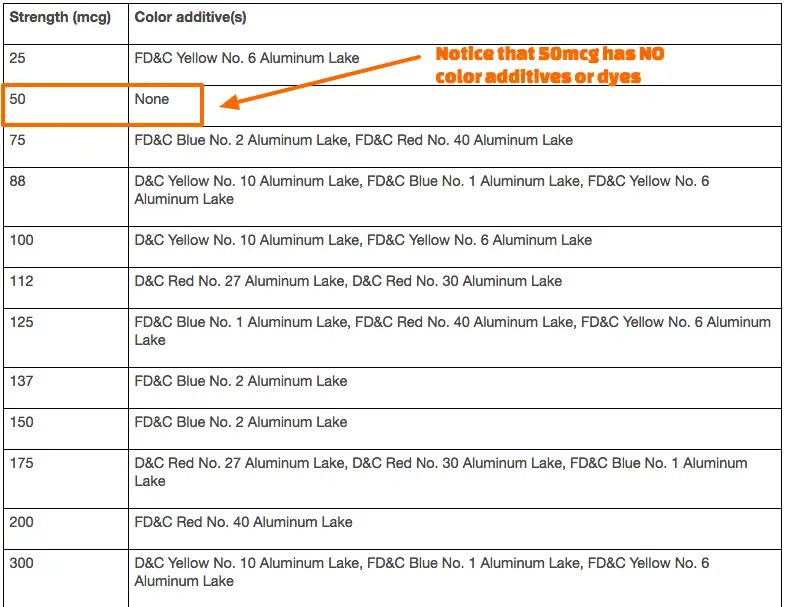
This chart shows that each of the different doses of levothyroxine contains various fillers and dyes that serve to alter the color of the pill.
The problem?
The simple solution to this problem is to take a formulation that contains the fewest amount of dyes and colorings.
You can do this by switching to a different type of T4 medication like Tirosint or by switching to the 50mcg dose of levothyroxine/Synthroid.
From the image, you may have noticed that the 50mcg dose of levothyroxine has no added colors or dyes which makes it the preferred choice for extremely sensitive individuals.
And, when switching the mcg dose of your medication, you can still keep your total dose the same.
Consider this:
If you are on 150mcg per day of levothyroxine then all you would need to do is ask your doctor to switch to 3 tablets of the 50mcg dose.
Using this strategy you would be keeping your total dose the same while removing the extra dyes and coloring agents.
If you are wondering if you are reacting to these dyes you can see a list of symptoms that may indicate you have a hypersensitivity reaction to the inactive ingredients:

Symptoms of hypersensitivity include:
- Hives, rash, flushing, swelling of the skin/face, intestinal pain, nausea, vomiting, unexplained fevers, sore joints, and even wheezing.
You can see a full list of inactive ingredients in levothyroxine here:
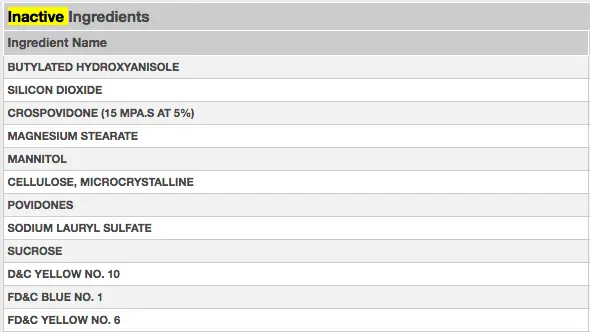
- Butylated Hydroxyanisole
- Silicon Dioxide
- Magnesium Stearate
- Mannitol
- Cellulose <—- many patients react to this component
- Sucrose
- Dyes and additives depending on the dose
Many patients react poorly to these fillers and dyes (4) and simply changing your dose or type of medication MAY improve your symptoms.
Is Your Dose of Levothyroxine Right for Your Body?
The next reason you may experience side effects has to do with your dosing.
As I mentioned previously if your dose is sufficient for your body then you should not be experiencing negative symptoms.
And it’s important to differentiate between the symptoms of the disease that you are treating (hypothyroidism) and the potential side effects of the medication.
Hypothyroidism results in specific symptoms such as fatigue, weight gain, hair loss, pain, menstrual irregularities, constipation, cold intolerance, and so on.
As you take levothyroxine, these symptoms should subside.
If, however, you notice a slight improvement (but not a complete resolution) then that may be an indication that your dosing is off.
If you notice completely new symptoms then that may be an indication that your symptoms are caused directly by the medication itself.
But, back to your dose for a second.
It’s important to realize that levothyroxine may not work for up to 15% of the population.
Certain patients, especially those with specific genetic defects in the DIO2 gene (5), may need a combination of T4 and T3.
T3, sometimes referred to as LT3 or triiodothyronine, is the active thyroid hormone.
How do you know if you fall into this category?
Those who fit into this category are the ones who do not feel better despite taking levothyroxine.

They are the ones who continue to feel poorly despite having “normal thyroid lab tests”.
If you fit into this category then you may need to seek out a combination thyroid medication (T3 in addition to your existing T3 dose).
How do you know if levothyroxine is working in your body or if you are on the right dose?
This can be assessed through a combination of your symptoms and by monitoring your lab tests.
If levothyroxine is working for you, you should experience some of the following:
- Your energy levels should be improving
- Your weight should be dropping
- Your hair, skin, and nails should be improving
- Your mood should be improving
- Your menstrual cycle should be more regular
- Your joint pain or muscle soreness should be reduced
- You should NOT be having constipation
These are what I would consider the “positive side effects of levothyroxine” meaning this is what SHOULD be happening when you take the medication.
You SHOULD experience an improvement in symptoms not an INCREASE in symptoms.
Why?
Because the medication should be providing your body with the hormones that weren’t there previously.
If you are on levothyroxine and these symptoms are NOT improving or they are getting WORSE then 1 of 2 things might be happening:
1. You are not on a high enough dose.
2. Levothyroxine (or Synthroid) is NOT the best medication for your body.
You can read more about the specific and how to find your ideal dose in this post.
Is Levothyroxine Causing You to Gain Weight?
Speaking of patients who may not tolerate T4 medications, let’s talk about levothyroxine and weight gain.
One question that I see asked fairly often is whether or not levothyroxine can contribute to weight gain.
It seems like an odd question given what we know about thyroid physiology, but let’s explore it for a moment.
Your thyroid helps to control your appetite, regulate your metabolism and help you burn energy.
It makes sense, therefore, that taking extra thyroid hormone should result in increased metabolism and an increased ability to lose weight right?
But, that isn’t what happens to everyone.
In fact, there are a number of people who seem to paradoxically gain weight when they use levothyroxine instead of losing weight.
If you fit into this category you are not alone:
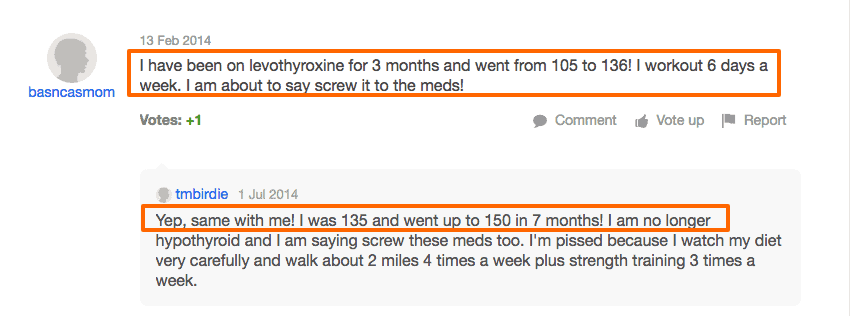
How can this be? Why does levothyroxine cause weight gain in some people?
The exact reason is not clear but it may have to do with how your body processes the medication once it’s absorbed.
Remember:
In order for your body to utilize thyroid hormone, it must be converted from the inactive T4 into the active T3.
This conversion process does not work equally for all patients.
It’s plausible, then, that some individuals may not activate the medication after ingestion.
In a sense, the medication is making it into their body but it’s not activating or making it into their cells.
What should you do if you fit into this category or what can you do to prevent this unwanted side effect?
Perhaps the best option is to switch medications or to use a combination of thyroid medications designed to provide you with both inactive and active thyroid hormones.
If you can find a doctor willing to prescribe Natural Desiccated thyroid or Liothyronine then you may be able to prevent weight gain from starting.
Does Taking Levothyroxine Cause Cancer?
The answer is that we don’t know for sure, but the research that exists right now is more than a little concerning.
Several large-scale population studies have shown a correlation between levothyroxine use and cancer that is higher than age-matched controls.
While correlation doesn’t equal causation, there does seem to be some association between the two.
My personal opinion is that this connection has more to do with the hypothyroid state than it does with the use of levothyroxine itself.
For instance, it’s likely that one of two things are true and it’s either or both of these things that contribute to what we see in levothyroxine users:
- Thyroid patients are taking either more or less than they need (they are not being dosed correctly). It’s easy to imagine that an improper dose of levothyroxine may be the ultimate problem here, not the medication, given that thyroid hormone itself interacts with just about every cell in your body. And we already know that improperly dosing hormones can increase cancer risk such as in the case of high doses of estrogen.
- Or the thyroid patient taking levothyroxine doesn’t actually need to be on it. Based on the latest research, approximately 30% of patients taking levothyroxine may not need it. You can imagine that if you are taking a hormone that you don’t actually need, it may increase your risk of certain diseases, including cancer.
Together these two scenarios likely explain this increase in risk that we see, but both can be solved by following the information presented here.
Is Levothyroxine Making Your Hair Fall Out?
Another big potential (and concerning) side effect of levothyroxine is hair loss.
I know what you’re thinking:
Doesn’t hypothyroidism cause hair loss and shouldn’t levothyroxine, therefore, help you to regrow your lost hair?
The answer is yes, in most cases, it should help you to grow your hair back.
But this isn’t always the case.
In fact, one of the potential side effects of levothyroxine medication is hair loss:

When it comes to hair loss there are actually several different variables that may be contributing.
I’ve gone over all of the potential causes of hair loss in thyroid patients in this post and you can start there if you don’t fit the standard mold.
So, how do you figure out what is causing your hair loss if you have hypothyroidism?
- If you had hair loss PRIOR to taking levothyroxine and it was made WORSE by the medication then you may be experiencing a negative side effect.
- If you had hair loss prior to taking levothyroxine and you don’t notice any difference or your hair loss isn’t reducing, then you need to look into other causes.
It’s important to figure out if your hair is caused by persistent Hypothyroidism (meaning your dose is still too low) or if it is caused by the medication itself.
When monitoring this make sure that you pay close attention to the amount of hair that you are losing both before and after you start your medication.
So what do you do if you think that levothyroxine is causing hair loss?
The best thing you can do is to switch medications.
You can switch from levothyroxine to Synthroid or from levothyroxine to NDT or from levothyroxine to Tirosint and so on.
Simply switching the brand of your medication may be enough.
If that doesn’t work you may need to focus on moving to a medication that contains T3 hormone (like NDT).
Some patients experience worsening hair loss when starting thyroid medication due to other micronutrient deficiencies (7) like zinc (8), iron (9), vitamin A, and selenium (10).
If you are deficient in these hair-growth-promoting nutrients then it may not matter if you are taking sufficient thyroid hormone.
Furthermore, simply repleting these micronutrients is enough to stop hair loss in some individuals.
Before switching thyroid medication make sure to check for these micronutrient levels. If you find yourself deficient make sure you find some high-quality supplements to replace them.
You can find more information about these nutrients here:
It’s also worth pointing out that T3 medications like Liothyronine and Cytomel can also make hair loss worse but this effect is usually temporary.
So make sure you watch out for this side effect when starting these T3-containing medications.
Negative Side Effects of Levothyroxine to Watch Out For
As I mentioned above most of the negative side effects of levothyroxine come from the fillers, dyes, additives, and preservatives found in the medication.
In addition, some people experience side effects because they aren’t taking enough of the hormone.
On the flip side, it is also possible for you to get too much medication and suffer the side effects of too much thyroid hormone in your body.
How do you know if your medication is too high?
You may experience the side effects of HYPERthyroidism:
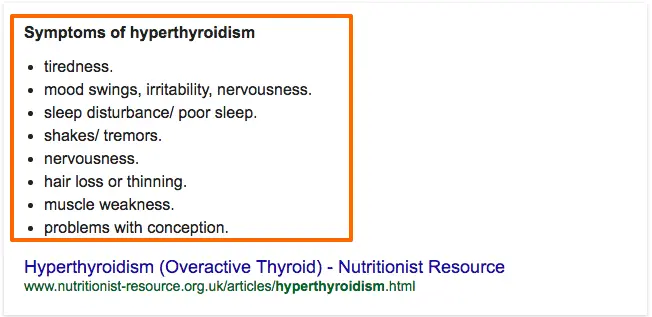
- Worsening fatigue
- Jittery sensation or nervous feeling
- Insomnia or inability to fall asleep
- Tremors or shaking/trembling of the hands
- Anxiety or panic attacks
- Worsening hair loss or hair thinning
If you experience any of these side effects you should see your physician as soon as possible to have your blood drawn and to potentially reduce your dose.
Excessively high doses of thyroid hormone may put you at risk for a condition known as thyrotoxicosis.
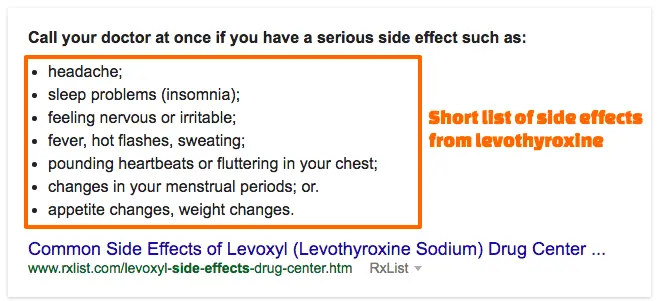
In addition to these side effects, I’m going to include ALL of the potential side effects as well.
Less common but serious side effects include:
- Chest pain or chest discomfort
- Difficulty swallowing
- Irregular heartbeat
- Hives or urticaria
- Menstrual irregularities
- Sweating or hot flashes
- Decreased urination
- Worsening fatigue
- Palpitations
- Heat intolerance
- Increased blood pressure
- Muscles aches/pain
- facial swelling
- Shortness of Breath
- Dizzy or lightheadedness
- Fever
- Increased pulse rate
- Nausea or vomiting
- Tremors of the extremities
If you experience these symptoms please seek medical attention as soon as possible. It’s important to realize that these are not very common (so the chance of them occurring is low) but if they do occur you may need some intervention which may include altering your dose or discontinuing your medication.
More common and less serious side effects:
- Abdominal pain or cramping
- Diarrhea
- Paranoia or distrust
- Muscle weakness
- Weight gain
- Reduced appetite
- Feeling “unwell” or “unhappy”
- Headache
- Feeling nervous
- Worsening fatigue
- Depression or anxiety
- Sensation of warmth
- Hair loss
- Infertility
- “Restlessness”
- Weight loss
These side effects are much more common but far less severe.
Some of these side effects may resolve over time without any intervention and others may require a small tweak to your dose.
Do you need to Switch Thyroid Medications?
Bottom line:
If levothyroxine or other T4-containing medications (Like Synthroid) are causing you multiple side effects then it’s worth a trial of a new medication to see how you respond.
If your symptoms are due to fillers, dyes, or additives then switching to a T4 medication like Tirosint may dramatically help (11).
If your symptoms are due to too much medication, then lowering your dose may help significantly.
If your symptoms are due to conversion issues in your body then adding medication containing T3 may improve your symptoms and side effects.
This information can serve as a rough guide to help you find whatever is optimal for your body.
In my experience, many patients do better on a combination of T4 and T3, but a handful of patients do worse on these medications.
Admittedly, I probably see a biased group of patients as most patients don’t come to see me unless other options have failed.
Most Doctors are not comfortable dosing or adding T3 thyroid hormone so it may be difficult finding a physician willing to switch your medication entirely.
Most endocrinologists will not have a problem changing your medication to Tirosint or changing the tablets of levothyroxine to 50mcg tablets if necessary.
Even though these are small changes they may have a large impact on how you feel.
If all else fails, you can use these tips to try and help you find a knowledgeable doctor.
Conclusion
Levothyroxine is a medication used to treat Hypothyroidism.
Even though it is bio-identical and is used to replace the lost thyroid hormone in the body many patients may react poorly to this medication.
Reactions or sensitivities may be caused by fillers, dyes, additives, or simply because it is not the RIGHT medication for your body.
Some patients may actually experience an increase in weight and an increase in hair loss while taking Levothyroxine. These symptoms may be directly due to the medication itself or because of how your body converts (or doesn’t convert) T4 to T3.
If you fall into any of the above categories or are experiencing negative side effects of Levothyroxine you can consider switching to a different thyroid medication like Natural Desiccated Thyroid (Armour thyroid, NP Thyroid, and Adthyza) or medication containing T3 (Cytomel or liothyronine).
Now it’s your turn:
Are you experiencing negative or positive side effects of Levothyroxine?
Is this medication right for your body?
What medication has worked best for you?
Leave your comments below!
Scientific References
#1. https://www.ncbi.nlm.nih.gov/pmc/articles/PMC4960754/
#2. https://www.ncbi.nlm.nih.gov/pubmed/23072197
#3. https://www.ncbi.nlm.nih.gov/pmc/articles/PMC2957945/
#4. https://www.ncbi.nlm.nih.gov/pubmed/25017684
#5. https://www.ncbi.nlm.nih.gov/pmc/articles/PMC2950057/
#6. https://www.ncbi.nlm.nih.gov/pubmed/28138133
#7. http://www.ncbi.nlm.nih.gov/pubmed/20172476
#8. http://www.ncbi.nlm.nih.gov/pmc/articles/PMC3746228/
#9. https://www.ncbi.nlm.nih.gov/pubmed/20888066
#10. https://www.ncbi.nlm.nih.gov/pmc/articles/PMC5315033/
#11. https://www.ncbi.nlm.nih.gov/pmc/articles/PMC3726924/
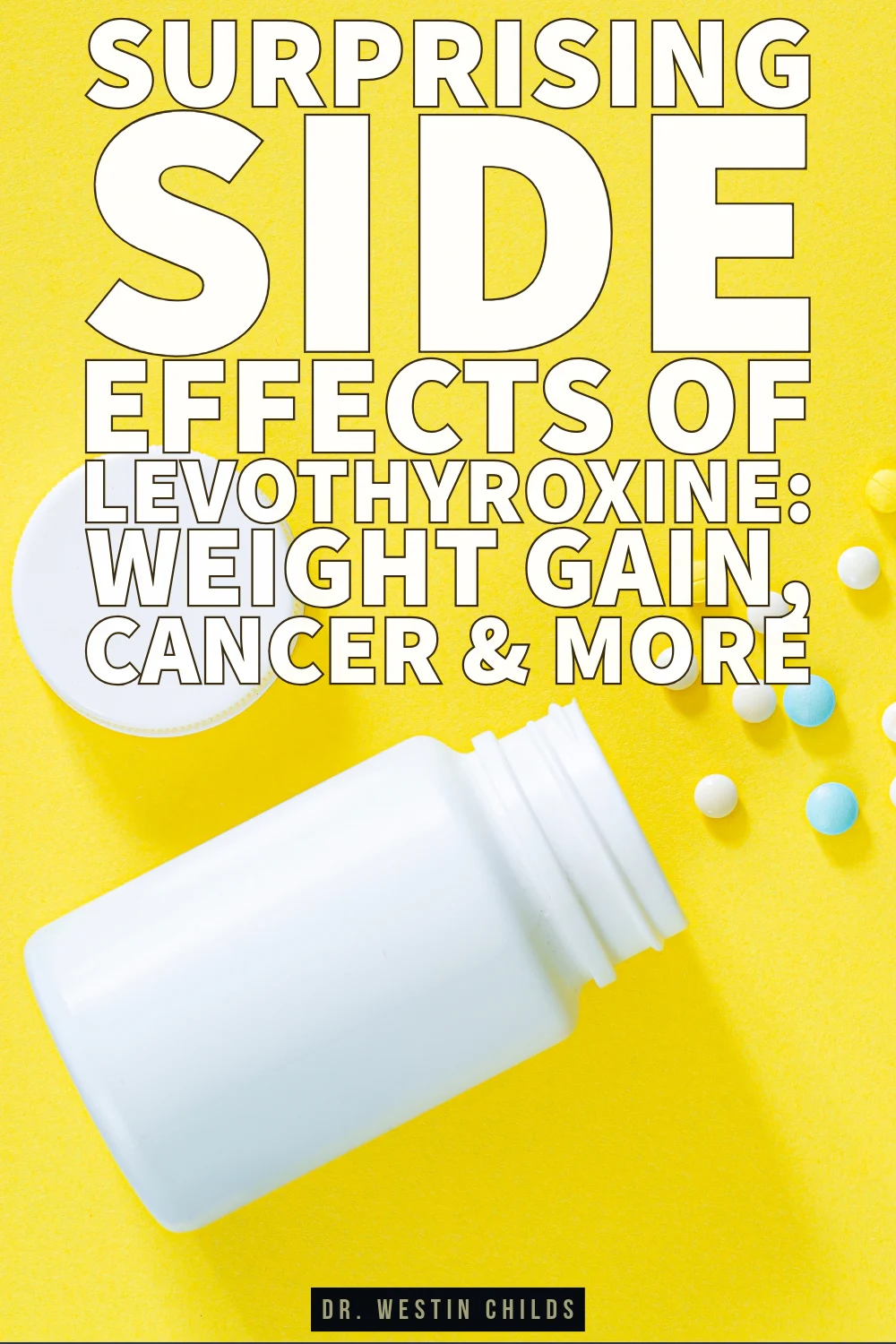
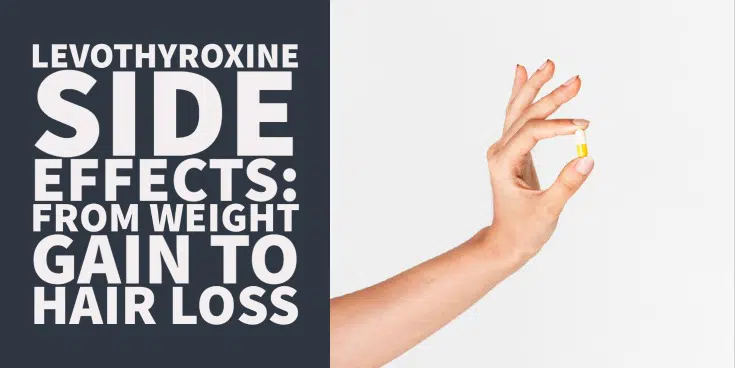


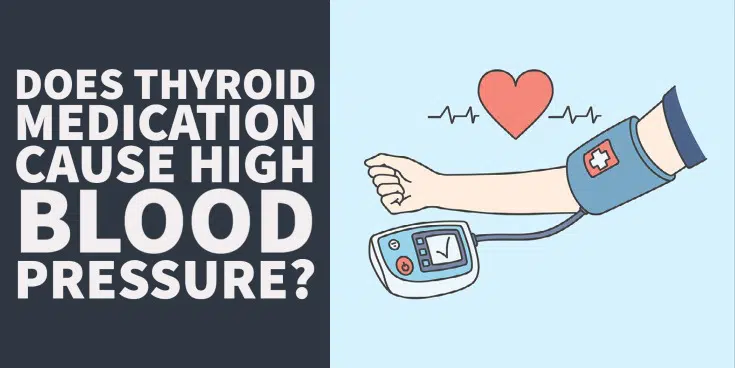

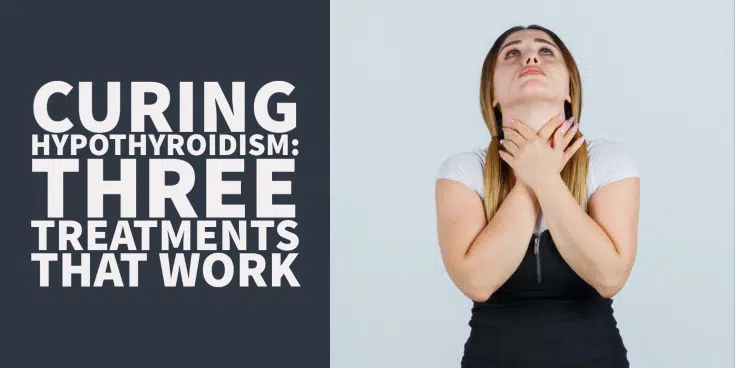
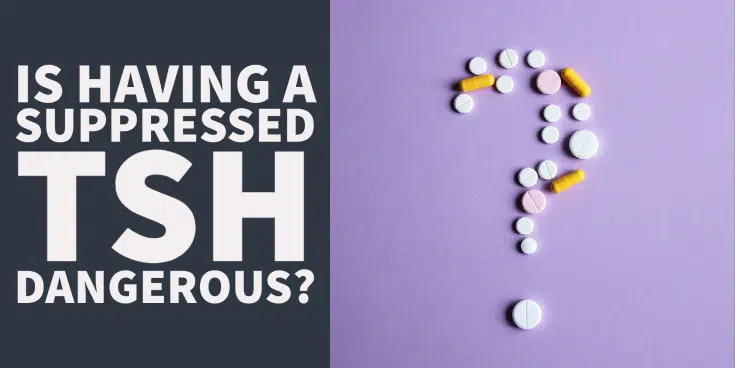

I have been on Levo for 3 years and still experience intense itching without rash. Would a different medication help with this. Also have Sjogrens. Sometimes have joint and muscle pain. Have a difficult time knowing whether the Thyroid or Sjogrens is the culprit behind many of my symptoms.
Hey Shellie,
Hard to say for sure – it would be worth a try to change medications (at least to something like Tirosint) to see if it helps. Also check your ESR and CRP and then monitor changes in medications, lifestyle changes, etc. to see what is working – both ESR and CRP are non specific inflammatory markers in the serum but can be helpful in tracking the progress in autoimmune conditions.
What lab tests should I be requesting from my current Dr? I have Hashimotos and also had a thyroidectomy. I am currently taking 125mcg of levothyroxine and after reading this, it just makes sense to make some changes.I worry about the armour,being of animal thyroid, I’d fear an increase of antibodies…is there a thyroid medicine that offers both T3 and T4 in a synthetic form?
Hey Tami,
If you have to request that all of the right labs be drawn there is a very high chance your doctor won’t know what to do with the results. And yes, you can add Liothyronine or Cytomel to your current dose of Levothyroxine or Synthroid if you want.
Fantastic publication, as usual! Thank you Dr. Childs!
Thank you, I hope it helps!
Great read!
I have been on Levothyroxine for 20+ years. I had my thyroid removed from cancer in 1992, and been on levo ever since.
They keep me on a high dose so my cancer doesn’t come back. I have a lot of the symptoms on your lists. I struggle with fatigue, weight gain, night sweats, early menopause at 32, mood swings etc. The doctors here tell me it’s all in my head, I have been diagnosed with depression, IBS, chronic fatigue, fibromyalgia, with about 20 other diagnosis they come up with. Not one will lower or change my Levothyroxine, they would rather prescribe anything else than change my dose. It’s been so frustrating over the years, I have given up trying. I’m in Ontario and not sure they have the natural thyroid medication here. At a health store in town, after telling the owner my story, he suggested a T3/T4 combination. Now I’m seeking at Doctor that will prescribe that 🙁
Thank you for posting this, it’s nice to know it’s not all in my head!
Hey Darlene,
You are welcome! Keep looking for someone to help you, it isn’t worth living your life feeling terrible if there is a better solution – even if it takes some time to find someone willing to help.
I wonder if your immune system has been tested? I too had your symptoms only to find out that I have a rare immune deficiency disease as well as Hypothyroidism! I have CVID and was born this way and was diagnosed 2years ago at age 60! I take monthly IVIG treatments in hospital for the rest of my life! I’d have your doc refer you to an Immunologist if possible! Best of luck!
I have had a thyroidectomy at 16 due to cancer as well as my lymph nods. It’s been 9 years. Started with synthroid then was changed to levothyroxine when they bumped me up to 200mcg. I go days within a month where I simply do not have the motivation or energy to get out of bed. Every time I visit with an endo, I’ve gone through about 10, they just do my blood work, it comes out normal then I never hear from them until it’s time to be RE prescribed. I feel like I’m not listened to and that this is just something I’ll have to live around. I only recently heard about the t3 conversion medication and am curious if I should be on it because I haven’t had a functioning thyroid my entire life. It just surprises me how left in the dark I’ve been for all these years feeling like there is no hope. Thanks for your post, I will be bringing these points up with my endo next month. Hopefully I get something different this time!
Hey Chanel,
You are welcome and Good luck! Let us know how it goes with your provider.
I had my thyroid removed in 2013, I was placed on levothyroxine 112mcgs, was able to manage my weight,felt happier,slept well, a year ago they lowered my dose to 75mcgs i went from 160 to 200lbs overnight,lack of sleep, extreme fatigue, depression, extreme numbness and tingling in hand and feet, severe muscle cramps, swelling, break through bleedig and beyond heavy cycles,not to mention bald spots. I don’t like the person ive become.minimal motivation when i do get motivated,im burnt out!
Hey Monifa,
I find that most patients post thyroidectomy do much better when T3 is added to their regimen. I would try to find a doctor local to you who can help manage your thyroid medication.
Hi Dr Childs
thank you for your continued supply of valuable information. I have Hashimoto’s and have been taking thyroid extract for five years. Initially I had a great result but antibodies were through the roof. My antibodies have come down dramatically but are still very high. I still suffer with weak muscles, weight gain, insomnia, constipation, psoriasis, intermittent hair loss, sensitivity to both heat and cold and fatigue. Is there anything you can suggest. I am in Australia (gold coast) and wonder if you can suggest a physician here or do you do consultations over the net,
Thank you again and I look forward to hearing from you soon.
Cheers
Deborah
Hey Deborah,
Unfortunately I don’t know anyone in that area. I know there are some integrative physicians in Australia because I’ve worked with some through my other patients.
Hello Deborah, I’m in Australia,in Northen Rivers.I have the same symptoms as you.I go to The Medical Sanctuary which is based in Benowa, to Dr Jolanta Paszkiewicz. It’s very difficult to find physician around here who would treat thyroid.If you need more information let me know.I will be happy to provide you more details.Cheers Margaret
Thanks for providing more info, Margaret!
I have all the negative effects of taking T4 only. After 6 years of telling people it is not working finally I found a functional medicine practitioner ho really looked at things and dx Hashimotos. After reading everything I could get my hands on I stopped the Synthroid. Trying to find a practitioner to prescribe something that works and am about at my wits end trying to find someone who understands this. So far only irritability as a side effect of stopping (but that could just be me too.)
Hey Dana,
I don’t recommend discontinuing the medication without the assistance of a physician – I know it can be tough to find someone to change medications, but it can be dangerous to completely withdrawal yourself off of levothyroxine.
I did this too recently. Synthroid was making me feel awful. I was taking other drugs for other things, so wasn’t sure what it was. Doctors weren’t listening. I got fed up and stopped for six weeks. Felt better immediately! Unfortunately, my labs at 6 wks showed I really did need something. Started back on Synthroid…started feeling icky again! Currently waiting for my mail order of Unithroid to see if that makes a difference. Ugh!
I had my thyroid removed when I was 42. I’m now 56 and have gone through menopause and I feel like I’ve been on a roller-coaster wrt my health. I’m on Naturethroid (1.5mg) but no one can seem to get the dose right. I super healthy and active and still right now feel like I’m 20 lbs overweight. I’m sure it has to do with hormones (versus diet and exercise) but the docs say everything looks normal. Is there something I do? I don’t feel badly, I just know I could feel better (versus – just getting older). Thank you so much.
Hey Debbie,
You can change what is in your control: diet, stress, sleep, exercise, etc. – I would try doing those things to see what kind of improvement you can get. Ultimately you may need to change your medication but to do that you will most likely need to find a different doctor.
Oh my goodness, I’ve NEVER heard of this! This is me and I’m calling my doctor tomorrow! I’m lucky to have found a local integrative doctor who is very willing to try new things and listen to my concerns. Thank you so much for posting this information, Dr. Childs!!
Hey Krikit,
No problem and good luck! I hope it works out for you, keep us updated 🙂
Hi Dr.Childs,
I’m a 35 years old mother of two & I live in the United Kigdom. I’ve been suffering from hypothyroidism for 12 years , developed the condition soon after the birth of my first child 12 years ago & was put on Levothyroxine ever since. All these years I never ever felt healthy and happy, I felt like nobody in the world understood me and my condition. I’ve suffered hard with constant tiredness, lethargy, depression & weight gain, I tried all the diets plans in the world but my weight wouldn’t budge. I felt like a complete failure, a bad mother who wasn’t even able enough to play with her kids in the garden for 15 mins ☹️.
I’ve been told over and over again that my bloods are absolutely normal, all the docs could do was to either increase my Levo dosage or decrease it. I started with 50 mcg, went right upto 250 mcg, brought back down to 200, 150 & finally to 175 mcg. But nomatter how high or low I went on the dosage ,my symptoms instead of improving went even worst. I started missing my periods, 3 to 6 months in a row, hot flushes, anxiety attacks, mood swings etc. I even got myself tested for menopause, thank God it came out negative.
Fed up and let down by the doctors, I decided to do my own research, I joined thyroid forums around the world, talked to thyroid patients, read books on the subjects and it’s through one if these forums that I heard about you and the brilliant work you are doing for patients like myself.
When I started reading your blogs, it felt like finally someone is saying out loud what I have been suffering all these years in silence. Someone actually knows exactly what I’m going through. I’m not insane, I’m just not being treated well. It was through your FB posts and blogs that I learned for the first time about reverse T3, so I got my metabolism tested and it turned out that my body is only burning 700 calories a day, which is absolutely pathetic Armed with the information I got through your blogs, I went to see my doctor again & persuaded him to refer me to an endocrinologist and he did☺️.
That was just the first hurdle, I had my ENDO appointment last month, he absolutely agreed to all the information I learned through your blogs and prescribed me a T4 T3 combination. I was on 175 mcg of Levothyroxine before but my endo insisted that Liothyronine is 5 times stronger than Levothyroxine so prescribed me 30 mcg of T3, which he thought equals to 150 mcg of Levothyroxine and 25 mcg of T4 to make the total combined dosage equals to the 175 mcg of T4 I was on before. I must say I haven’t been feeling particularly well on this combination apart from my periods are now normal. Just by chance I stumbled across your recent blog about the T4 to T3 conversion chart & am now wondering I might be under treated!
My next endo appointment is on the 3rd of October , please advice me accordingly. So I’m well prepared for the appointment.
Thanks for all your help and advise through your blogs, keep up the good work!
Best Regards,
Rubiya Mir.
Hey Rubiya,
That’s interesting that he was willing to treat you with T3 medication, most of the people on this blog from the UK tell me that no one is willing to give it to them? In terms of your dose, each person is quite unique in terms of how much T3 vs T4 they need. Studies show that T3 is 3.4x more potent at lowering the TSH compared to T4 but I find that it’s only about twice as strong in terms of symptomatic relief when compared to T4 only. Depending on what your reverse T3 is you may want to consider going down on the T4 and up on the T3 but you need to consult with your endo.
Thanks Dr. Childs for your prompt reply, you are so right, doctors don’t often prescribe T3 on NHS in the Uk, I’ve been really lucky to have found the best endocrinologist in town who was actually quite sympathetic towards me, Or it could be as they say that “knowledge is power”, because I now know so much about my condition ( thanks to your FB page) that the endo couldn’t disagree with the facts & he had no choice but to prescribe me T3, either way I’m glad that finally I’m on the right path! . I did ask my endocrinologist to test my reverse T3 levels too but he just said they don’t do rT3 tests on the NHS. But I’m wondering does my low metabolism mean that I could have high levels of rT3 anyway? I also did some self medication & took pure T3 ie: 40 mcg for two weeks in split doses ( instead of 30 mcg T3 & 25 mcg of T4, as prescribed by my endo) and to be honest I felt a lot better although not 100% but immediately I had a bit more energy, was thinking clearly, sleeping better, no heart palpitations, no mood swings etc, even my husband noticed the positive changes in me, but now I’m back onto my prescribed dosage of combined t3,t4 treatment as I don’t want to run out of my t3 before my next prescription collection date, pharmacies are very strict here about issuing prescriptions on time. So now I’m back to my old miserable self .
I really want to be on pure t3 now. Is it safe to be on t3 for life? According to your conversion chart , 175 mcg of Levo should be equal to roughly around 85
mcg of t3. I felt fine at 40 mcg t3 during my trial run, should I try to push my luck and ask my endo to prescribe me atleast 60 mcg of t3? Keeping in mind that he firmly believes t3 is 5 times effective than t4, it might not be easy to convince him otherwise. But is it safe for me to go from 30 to 60? What do you reckon?
Regards, R.mir
I forgot to mention that ever since I’ve been on the combined t3,t4 treatment, my hands and feet are constantly numb, specially pin & needles in my left hand and left foot. Also I’ve noticed some white patches (like vitiligo) appearing on my neck and arms…. Are these symptoms related to hypothyroidism aswell or sign of being undertreated?
Regards, R.mir.
Dear Dr.Childs, I have been on Levothyroxin for 20 years, a year ago my new doc told me that I have a problem with T4 to T3 conversion and suggested T3 treatment, which I was very thankful for. I was taking 100mcg of Levothyroxin and added 5mcg of T3 medication.I did not see any improvement of my symptoms so I increased to 15mcg of T3 and went down to 75mcg of Levothyroxin. I realised that my digestion improved but low body temperature and low pulse rate remained unchanged. My last lab tests revealed relatively low T3 and very low T4 as well as very very low TSH. My doc is opposed of doing the rT3 test… Now she wants me to quit taking T3 and to take levothyroxin only, she said that my entire system is very much “confused” and she blames the T3 medication for it. I am afraid of going back on Levothyroxin only since I do not want to face constipation and weight gain again. What do you think?
Hey Joanna,
Unfortunately I’m not able to provide you with medical advice. I would recommend you follow the instructions of your current physician, and seek care elsewhere if you feel your care is substandard. Each person is very unique and managing medication takes time and iteration.
Wonderful article, which I have shared on our New Zealand Thyroid Association Website – and our group are finding it so helpful – thank you !!!
I suffered through so many horrific side effects end on 2007 to mid 2008 when GSK changed the formula of Eltroxin (which was the only brand NZ had in those days.) No Dr or Endo agreed that Eltroxin was he cause – it was a nightmare. That was why we created the Thyroid Association of NZ 🙂
We now have Synthroid and Goldshield as alternatives, and are subsidised by our government. Having said that, we can also get Whole Thyroid Extract, but it is not subsidised,so many cannot afford it.
I was taking WTE, but since moving to France, am now ordering Thyrovanze from USA (made from NZ cows thyroids) and are finding it just as good.
I will NEVER go back on synthetics, as since the Eltroxin debacle, I no longer convert T4 to T3 very well.
Hey Jilly,
I’m glad you found it helpful and thanks for the share!
I’ve heard similar stories from other patients so thank you for sharing as well, unfortunately small changes can have a huge impact on certain patients.
Dr. Childs, thank you for presenting so much great information in an easy to comprehend fashion. I am one week post op from a total thyroidectomy due to follicular carcinoma. I started taking 100 mcg levothyroxin the day afte
Hey Adriana,
No problem, I hope it helps!
Hi Dr. Childs,
I have been on thyroid med for 35 years… Need a good endocrinologist in or around St. Louis. Any suggestions? If no, would you take a new patient if I flew in to where you are located? I am very frustrated as I have gained weight and am tired all the time. My dr. Says I am “good” and “within range!” Thanks for your help.
Kelly
Hey Kelly,
I’m not seeing patients right now but I will send out an email if that ever changes!
Hello, great info! I have been on levothyroxine for years, switched to Synthroid seems to control numbers better. I have tried Armour, gave severe migraines, tried naturthroid low dose, extreme palpitations! Doc put me back on Synthroid. Fatigue, extreme hair loss and brain fog! Taking supplements, trying to eat right, but exhausted and frustrated!
Hey Lori,
Have you tried synthroid + cytomel? It might be worth looking into.
i feel it is not helping the levothyroxine, I am currently losing weight finally and can hardly eat anything to keep it off even if exercising. Severe hot flashes are a real big deal. I have been losing hair and my moods have not improved even though im on anxiety meds and antidepresant. ive been on this med for 3 years and my doctor just kinda ignores my questions when i bring things up.
Hey Christina,
You may need to find a new doctor willing to work with you.
I was on levothyroxine, experienced hair loss, depression, fatigue, no libido…just not any quality to my life. I switched to Naturethroid (changed from Doctor to naturopath) and some things did get better. Less hair loss and lethargy for sure! I worried about being on pig thyroid so I switched back to Levothyroxine at a higher dose (dr used conversion chart to prescribe equivalent). My question is…is it risky to take animal thyroid? I’m vegan and really hate the idea of taking pig thyroid but if it makes me feel and function better I will switch back! Thank you for helping us…what a great service you are offering for free
Hey Brenda,
I’m not sure what you mean by risky. If you don’t want to take NDT then you can always try adding T3 to your T4.
Hello,
After 30 years of acceptable results from levothyroxine I have been struggling to regulate my meds. It’s been 5 years of trying one thing after another. Recently, I was switched to Levoxyl 75mcg & Cytomel 25mcg. Is there any chance either of these or the combination could cause liver and pancreatic pain? My gall bladder was removed years ago and this is a new symptom.
Dear Doctor, I was Dx w/ hypo @ the textbook age of 50. I did very well on Levo fo 13 years. This year Dx w hasiimotos still on Levo currently 150 you describe my negative results as if you are quoting from my medical records: hair, weight, fatigue depression etc. should I add zinc and selenium to my Meds?
Reading your blog, so many people would like to have you manage their care, please consider Telemedicine. Thank you in advance for you suggestions.
Hi im on my third minth of Synthroid. At first i have felt amazing, energy working out eating better loosing a few lbs and inches. Havent felt this great in years! changed to low or no breads and sugara mostly protein and veggies! bloating gone feeling super!
Now about 3 mths in I started with intermittant diarea and now have had that and extreme exhaustion for several days. Thought flu but nobody else in house got it? Last levels were just checked and i was told to contibue for next 6 mths also intermitttent nausea and headaches.
Maybe too much now as thyroid getting better? does that make sense?
Thanks,
Amy
Hey Amy,
It’s possible. You can check out your labs for more information.
I have been on Levo for about 4 yrs and feeling ok, until about the last 6 wks feeling horrible insomnia, irritable, mood swings, racing in my head,very emotional and sensitive and daily headaches (have had bad headaches since about the time I started this medication, but never put it together. I made my doctor do blood work and she says I’m good, it has nothing to do with my thyroid. Here’s my results tsh .37 (0.27-4.20), t4 19 (12-22), t3 4.4 (4.0-6.8)…tsh and t3 look low to me??but what do I know, all I know is I can’t continue feeling this way. I also asked to try natural meds and she said she doesn’t prescribe them. How would I go about finding a doctor who does (I can’t afford a natural or functional medicine dr at the moment). Thank you for any advice you might have as I feel helpless and on my own to figure this out as my dr seems to not care how I feel, she just dismissed me basically.
Hi i am a 25 year old female who has been diagnosed with hypothyroidism about 3 years ago. I am on 150mcg and it seems to be working well for me, improving my mood, energy, and other mental well being but once i was on the 150mcg long enough for my body to get used to it i noticed that my stomach issues are ten times worse than when i was on 125mcg. Although with the 125mcg i still had IBS symltoms. Since the levo seems to be working for everything else but my digestive tract, is it possible i have IBS along with hypothyroidism? No matter what kind of diet i have it doesnt ease my IBS symptoms. Not even salad!! So im wondering if its possible to have IBS too or if its the medication?
Hi Jessi,
Your abdominal symptoms could be exacerbated by the medication if you are intolerant to some inactive ingredient, but it’s unlikely that your medication is the only factor.
Hi, I was on 50mcg of levothyroxine for a week and a half after I was diagnosed with postpartum hypothyroidism. As soon as I started taking levo, I noticed I was extremely tired (more tired than before), felt very depressed and unhappy, jittery, didn’t have an appetite, anxious and very emotional. I went from being a very happy momma to feeling like I was losing my mind in the matter of a couple of days. I felt perfect before starting levothyroxine. I stopped taking the medication last Wednesday and feel sooo much better. Could it have been the medicine that made me feel so depressed to the point of making me feel like I was at the beginning of postpartum depression?
Hi Morgan,
It’s certainly possible, everyone reacts somewhat differently to thyroid medication.
I had taken 175 Lfor years, decided to change doctors because said doctor didn’t listen to symptoms and refused to run all the tests that I had read were important. New doc in Nov 2016 reduced me to 150 L-Throxine, said hair loss etc could be due to overdosing. Here’s where the plot thickens… shortly thereafter I was diagnosed with breast cancer. Double mastectomy Jan 2017, no chemo or radiation but started Tamoxifen March 23. New endo has continued to monitor me with TSH about every 6 weeks. My hair is still falling out, I’m tired, fatigued (more so) hot and really can’t say for certain if it’s side effects from Tamoxifen because I already had things going on previously with my thyroid! I need to know what to do because I’m due for another endo appt which I’ve already delayed. Are there tests that will tell me exactly what’s going on? Pls help!
Hi Julie,
Not really, the medications you are taking will make evaluation of your lab tests difficult for most standard physicians. There is also the component that they have pharmaceutically induced menopause and vasomotor symptoms which will make serum estrogen tests less helpful.
Most likely you are suffering from a combination of symptoms including vasomotor symptoms from tamoxifen and either hypo/hyper thyroid like symptoms from your medication. Thyroid testing may be helpful, but that’s assuming they interpret your thyroid lab tests as I discuss here.
Where are you located?
Do you see patients in an ocffice setting ?
I live in Alaska and my Endo is unconcerned that my TSH has risen to 5.3
And that the synthroid leaves me worse off.
They do not like NDT.
And are loathe to prescribe it.
Hello, I was diagnosed with a severe case of Graves Disease at the age of 12. When I was 13 they radioactively killed my thyroid as I wasn’t responding to any medications. Since then I have been switched back and forth from Levothyroxine and Synthroid with many different dosage changes. When I was 20 I was diagnosed with Addison’s Disease. Since then (the last 6 years) my Levothyroxine dosage has changed at least two times a year. I’m always cold, no matter what I do I can’t lose weight, I get depressed very easily, and my hair is always falling out. My doctor lowered my dose 2 months ago and since then I have gained 20 plus pounds. Should I be talking to my doctor about adding t3 or should I be trying to go the NDT route?
Dr. Childs,
Aloha! I was diagnosed last May 2017 with Hypothyroidism. My TSH was at 7.5
In 2011 I had a Lobectomy and didn’t have to take any medication for 6 years until last year May 2017 that I was diagnosed with Hypothyroidism due to my symptoms hair loss, hard time breathing and tiredness. I am a military spouse and my physician “at the moment” prescribed me 75mcg Levothyroxine. The first 3-4 months I didn’t noticed changes beside my hair loss and fatigue was improving. I didn’t gain any weight, I am still 122lb(56kl) but after the 3-4 months I started to feeling very sick to the point that I was in and out the ER. I follow up with my physician “second military doctor” and she increased my Levothyroxine to 88mcg. After a week she increased I went to the ER from having some panic attack. I never ever had such a things like panic attack. She dropped done to 75mcg again and I was ok but still tired, hot flashes all the time, moody and very emotional. January 2018 was a very stressful month at work, lot of things happen out my control, high stress, and by the end of January 2018 I started feeling worse and worse, I follow up with my physician “third military doctor” and my TSH at the time was 4 to 5.
February 26, 2018 I got the biggest panic attack, numbness half of my body, shaking, not able to breathe and worse I was driving in a freeway. So I called 911 and they took me to the ER again. The ER doctors provided me Lorazepam 0.5 and I was relax. The next day I went to see my physician “the third Dr.” she told me that we can treat my anxiety so she put me on Zolof. By the third day I was on Zolof I got the worse experience to the point that My husband who is an U.S active duty had to flight home to take care of me and our daughter. So I stopped the Zolof because the ER Dr. recommend and yes I won’t take it anymore! After resting all this past weeks, I had the time to educate myself on Hypothyroidism. I been waiting to see a endocrinologist for a second opinion but a has been very difficult in Hawaii due to insurance etc. My husband and I willing to pay out of pocket to really know if I need hormones medication. Today, I went back to see my physician “still with the third military doctor” and I asked her; what is my T3 and T4 since the very beginning of this treatment? She said let’s look; so my T3 and my T4 has been always normal. The only thing is my TSH in May 2017 was at 7.5 with a normal T3 and T4.
6 weeks after I started to take 75mcg my TSH showed 1.3 so a was always around the range. I asked her so why I am taking hormones medication if my T3 and T 4 are fine? She said well a seems like due to your previous symptoms the doctor recommend you to be on 75mcg Levothyroxine, and I said; do I really need it? What happen is I stop? Would I get worse? She decided to dropped to 50mcg and see how the goes. I told her that my symptoms was showing that I am on TOO MUCH levothyroxine and she said the only way to know is trying. So I am here to hear from you and your opinion on this matter. I want to stay healthy physically and mentally. Thank you and God Bless!!
Hi Dr. Childs
I have been taking Levothyroxine 100 mg for 15 plus years following my diagnosis. I have always coped well on this medication. However, in early March I noticed significant hair shedding and since then each time I wash my hair it comes out in massive handfuls so much so I have probably lost around 60% of my hair in the 6 weeks. My hairdresser asked if I had changed my meds and I said no but when I checked my Levothyroxine it was a different brand I’d been given….it had been changed to the ACTAVIS Brand!! I checked some sights on the web and there were lots of posts from women experiencing the same thing in particular when being given ACTAVIS. Do you think I am reacting to the fillers/additives? I stopped taking the Levothyroxine 3 weeks ago and have to see my GP next week to discuss but would be keen to get your thoughts. By the way, I’m still experiencing hair loss currently! Many thanks, M
I read your article with interest. Can you explain the difference between Hashimoto’s and hypothyroidism? I recently requested some medical records. I was diagnosed more than 20 years ago with Hashimoto’s, but that term was never used with me and shows nowhere else in my record other than at diagnosis. It appears that my difficulty losing weight, muscle and joint pain, and depression could be because I am not being fully informed of other things I should be doing other than taking the Levothyroxine. I have it had a dose change in years. I would appreciate your input.
Hi Heather,
Hashimoto’s is an autoimmune disease which causes hypothyroidism. Both conditions can result in the same symptoms, but they may be caused by different things.
You can learn more about Hashimoto’s here: https://www.restartmed.com/hashimotos-thyroiditis/
This article states that generic 50mcg has no fillers in it. This is not true.
Hi Denise,
That is correct, it has the fewest of all of the other formulations but it still contains some fillers. Sorry if the wording is confusing. Tirosint is certainly more “pure”, but that’s not the focus of this article.
Hello Dr. Childs,
I just found your blog, I’m 38 and I’m taking Levothyroxine 112mcg at the moment I lost the weight I had a swollen face, but my hair keeps falling off …..is there anything you can recommend to ask my Dr. A test, medication etc please help.
Hi Cristy,
The best place to start is with a complete thyroid lab panel. You can learn more about all of the tests required here: https://www.restartmed.com/thyroid-tests/
Hi there,
I took generic levothyroxine only 4 days a week for a month, .25mcg, and noticed blurred vision and sensitivity to sunlight while driving. My pharma, endo, AND my primary thought levothyroxine highly unlikely to cause this. Primary said to stop it for 30 days. After two weeks of going off of it, my vision was perfectly fine again. I started again after being off the drug for one month and my blurred distance vision and sunlight sensitivity returned after three days of taking the same meds. My pharmacist and Drs are shaking their heads. It’s at least a two month wait before I see a functional medical dr to get some help. What should I do in the interim? I’ve had hair loss with fine thin tangly hair since 2014, fat gain in hips, stomach, and thighs as I go through menopause, very high estrogen to progesterone ratio which worsened after I tried .20 mg of natural progesterone a day and I discontinued that too. My free urinary cortisol also came in at 48 on a range of 0-50 which I think is TOO high but it of course was not flagged high by the lab. I am taking Relora for that. I’m 54 and going through menopause but not there yet. My antibodies tests showed I do not have an autoimmune condition. Aside from estrogen being too high which I think is causing all these other issues, I do not have other medical problems and don’t take any other meds. So, should I just get off the levothyroxine until I see a functional medical dr in 2 months? My TSH is 4.5, Free T3 2.2, Reverse T3 17.7..these are all contributing to symptoms I think, though the traditional Dr’s disagree.
In the meantime I am taking my selenium, zinc, B, C, E, iron, Vitamin D, etc. all based on what I know I need from my labs as well as from knowing I am lacking these nutrients from adequate food sources. Thanks in advance if you can offer any advice!
Dr. Child’s,
How do I go about finding a doctor that is as knowledgeable in this field and treats as you do? My endo won’t even talk to me.
I have RA, diabetes and Hashimoto’s.
Hi Kim,
You can try to use the resources here to help: https://www.restartmed.com/thyroid-doctor/
Hi,
Was diagnosed with Hypothyroidism ( TSH of 59) three years ago and put on Levothyroxine 100mcg, couple of weeks later on 88mcg according to lab results (TSH of 36)
Was stable on 88mcg for a couple of years until just recently I picked up a new refill and the symptoms I had after taking a dose were those of a hyper thyroid. Went to the doctor due to chest discomfort and rapid heart beat and the blood test showed a TSH of 0.12, which then I was lowered to 75mcg. I started taking them, and still am experiencing fast heart beat and chest discomfort. Does this mean the dose is still to high? I’m kind of nervous taking the pills now and am not sure what to do.
Obviously I’m scheduling another trip to the doctor.
Just wondering if the thyroid sometimes can cure itself over time and go back to normal?
Mine started out with a TSH of 59, now 0.12
Hi Stefanie,
It’s possible that your thyroid disease can become normal over time but very unlikely unless you are actively taking steps to try and treat it.
I have been on levothyroxine 112 for 10 years. I weigh 80 pounds more than I did 10 years ago. I feel tired, feverish. Hair loss, swollen feet. Broken nails and have joint pain all the time. I have Hashimoto’s as well as tumors in my parathyroid. The specialist felt the parathyroid issues were causing no problems but said the thyroid is torn up from Hashimoto’s yet they do not change anything for me. Just keep me on levothyroxine.
Hi Jenny,
It may be a good idea to seek out a second opinion!
I was diagnosed with hyperthyroidism, I went through iodine radiation treatment and took Synthroid for years, for the past 2 years have switched to Levothyroxine, 175 mcg tabs, I constantly fight fatigue, hair loss, I can fall asleep at night but never stay asleep, even though my lab tests say there in normal range, is it possible this medicine isn’t working?
Hi Lori,
I would recommend you take a look at this post which outlines the difference between normal and optimal lab tests and why it makes a big difference in how you feel: https://www.restartmed.com/normal-thyroid-levels/
I was on Armour for years and never had an issue until I moved and could not use my original PCP. My new PCP decided to switch me to Levothyroxine saying Armour is to old school and sent me to a new endocrinologist. The same tests were ordered all over again and the dose of Levo was raised even though I kept telling them I was having negative side effects. The Endo would not put me back on the Armour but, said your PCP originally changed it and will have to fix it. The PCP said I’ve sent you to the Endo and it is their job to treat you for your condition now. So in the end of all of this I quit taking all medication and was scraping by until I had my hysto a year ago now I’m back to square one all symptoms are worse than they were. Since this all started with the new PCP 3 years ago I’m hoping at my upcoming annual I can get it all back the way it was thankfully the PCP has retired and I have been put with another even though I’m sure it will start from square one again. My point is that I’m furious I was switched from Armour to Levo for no reason except the PCP thought it was too old school. Neither PCP nor Endo would listen to me the only one in my court was the OBGYN that performed my hysto. What other options are out there if this new again PCP refuses to listen to me?
Hi Lori,
I would take a look at this post which can help you find a knowledgeable thyroid doctor: https://www.restartmed.com/thyroid-doctor/
This is the best medical article I’ve ever read on the web. Period. Exclamation Point. Somebody give this man an award.
Thank you for being so thorough and providing hope for a myriad of situations and side effects.
I am 24 and have been classified as hypothyroid. My mother has it as well.
I’m on the levothyroxine at 25 dose and it makes me feel terrible! I get hot flashes, and I’m incredibly tired, with restless sleep.
I took it daily for 6 months and once tests came back, I told my doctor these symptoms. He suggested a half pill. After another month with symptoms persisting, I stopped taking it all together. The fatigue was making it impossible to function. At the next bloodwork, I advised him of my non-compliance with the regimen and he has now suggested a half pill every other day to see if I can tolerate it.
Two doses in and the fatigue is back. I’m not sure if I will last the six months. At this rate, I may ask for the two-medication regimen, because that is what my mother takes.
I also know she has the same symptoms, however, she attributes it to a crappy thyroid.
I was diagnosed at the age of 12 with hypothyroid. I have seen so many doctors through the years I have lost count. There have been multiple times when I have sat in a physicians parking lot after a visit and cried from complete exhaustion and no hope of anything changing. I have been on and off medication. The biggest symptom has been fatigue. I have addressed the fatigue with a sleep test, taking supplements, tried antidepressants, diet pills, addressing stress, exercise, PMS treatments and more. Tried it all and still have fatigue, low T3, and weight issues. I spent most of my professional life trying to hide how exhausted I was. Are you experiencing negative or positive side effects of Levothyroxine? I have never experienced what I perceived to be negative effects on any of the many different thyroid meds I have taken. Most did nothing.
What medication has worked best for you? I have found that Armour is the best for me. It elevates my TSH but I feel better. I still have the 3 PM, sudden loss of energy and desire to sleep but not as bad as it was without Armour. I know that 3PM suggest adrenals issues. I have tried several supplements recommended by alternative healthcare providers but none seem to make much difference. In the last 4 years, I have been following a lazy keto diet lifestyle. It has made an amazing difference in inflammation. The Armour was the first medication I took at age 12. Somewhere along the way, it was suggested I try something different or insurance would not cover. The last 8 months I have been taking it again with good results. Though I still have fatigue, just less. I also take bio-identical progesterone with very very small estrogen using an E-string. I think women should check into using progesterone as it made a difference for me. If I get out of syncs with the three I get very very fatigued.
Hi, I’ve been taking 175 mcg of Levothyroxine for over a year now. I haven’t really seen any changes. I’ve lost weight, gained it back. Mood swings are out of control, I’m moody etc. TH levels are out of whack. It’s getting frustrating and I don’t know what to do anymore.
Hi Dr Childs,
I luckily came across your site today and wanted to ask you a few questions.
I developed a hypothyroid 20 yrs or so ago. I had researched a lot on the subject and ask my doctor to put me on armour thyroid. So for 20 years I have been taking Armour. It was cheaper than a synthetic also. Well the last couple of years Armour has jumped from pennies to 60.00 a month. So I asked my doctor to switch me to a synthetic. He switched me to Euthyrox 112mcg.
I never realized what I have been going through, was because of the change of medicine. Im constantly itching, breaking out, extremely tired and irritable, occasional chest pains, and leg cramps, and my fingernails have horizontal raised lines on all of them. Cracked feet and extra dry skin. Mild hair loss.
When I was on armor, my weight never dropped to my ideal weight but had maintained from 160 down to 130. Nor did I show many signs of what is happening on the synthetic. Infact my weight has increased in a year to 177 pds. And nothing I do lowers it.
After reading what you have explained, I can see I need a medicine change. But Armor is so expensive and insurance pays ZIP…none!!!
Can you suggest what Is out there that will give me the same benefits as the armour did? Also do you know a good doctor in the SLC, Ut area. Right now I am just seeing a PA-C. (Which I adore, but think I should see an endocronologist.)
Thank you so much and God bless.
Dear Dr Childs,
I forgot to leave my name in my other text, sorry.
Plus I had my PA-C run a full set of test, something I read from somewhere, so when I went in for the results, he said my to tests are good. I ask about the other blood work and he said my antibodies were a little high. And thats where he left that!
Thanks again
Sally Larsen
I’ve been on Levothyroxine 50 MCG for the last 4 or so years. I have t had any side effects as of yet. I lost from almost 150 lbs to 125 lbs. I’m 69, so that’s the main reason I’m tired. LOL
Dr. Child’s,
I had been on Armour thyroid for several years and it was working well. My dose was 60mcg QD. The cost went from $18/month to $89 so I spoke with my practitioner and they switched me to 100mcg/QD if Levothyroxine.
After I had been on the new med about a month I began having sever bilateral hip joint pain. This is pretty significant pain and I am usually a very active 67 year old female. I was baffled and noticed in addition to my hip joint pain, my shoulders, knees and elbows started having pain.
I am a nurse and looked up the side effects and saw joint pain listed. I contacted my doctor and we switched back to Armour about 3 weeks ago. So far the pain hasn’t diminished.
My doctor ordered a barrage of tests to rule out rheumatoid arthritis and several other metabolic and cbc panels. Everything was normal except my CRP is 20, which is quite high.
I have a couple questions, can this intense joint pain be from all the additives and fillers you mentioned? Also, how long can I expect the joint pain to continue? Is there any other factors I should consider?
I appreciate your advice.
Robin
Hi Robin,
Joint pain is not typically from the fillers though I suppose it could be possible. You can learn more about the connection between joint pain and hypothyroidism here: https://www.restartmed.com/hypothyroidism-chronic-pain/